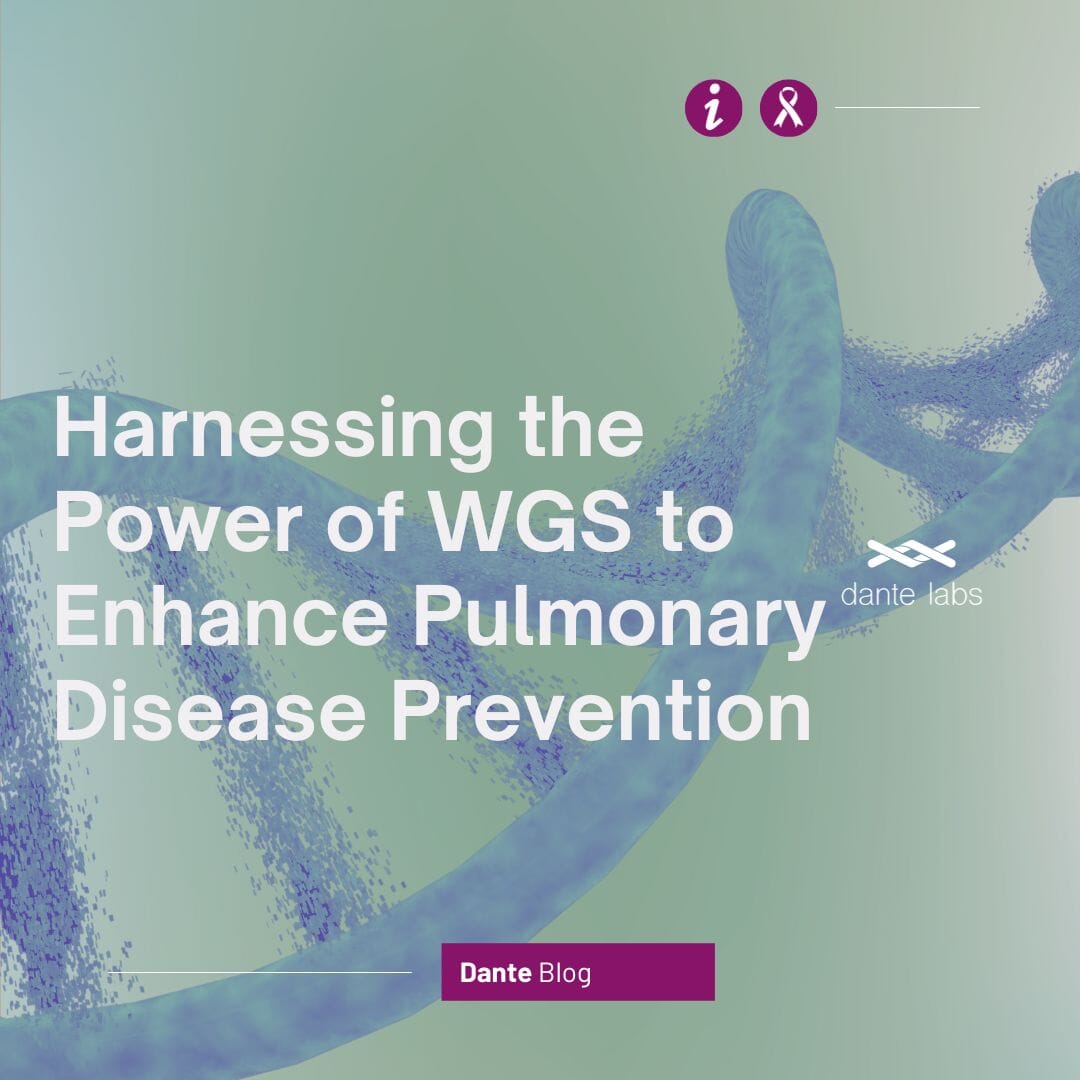
Harnessing the Power of WGS to Enhance Pulmonary Disease Prevention
Share
Introduction
On World Pneumonia Day, it is critical to explore innovative approaches to address lung diseases and minimize their impact on global health. Whole genome sequencing (WGS) is revolutionizing the field of genomics and offers enormous potential for the prevention and management of lung disease. Knowing your predispositions to lung diseases allows you to intervene early, before these diseases can manifest themselves in full severity. Let's explore which lung diseases depend on our genetics.
The Promise of WGS in Pulmonary Disease Prevention
Pneumonia, an acute respiratory tract infection, is one of the major causes of mortality worldwide. The risk of pneumonia is partially driven by host genetics. CYP1A1 is a lung family gene expressed primarily in peripheral airway epithelium. Genetic variants of CYP1A1 alter gene activity and are known to contribute to lung inflammation, which can cause the pathogenesis of pneumonia.
Whole Genome Sequencing is a cutting-edge technology that allows scientists to examine an individual's complete genetic makeup. By analyzing the entire genome, WGS provides valuable insights into an individual's genetic predispositions, susceptibility to diseases, and potential therapeutic targets. When it comes to pulmonary diseases, such as pneumonia, WGS can significantly enhance our preventative strategies.
WGS allows physicians to identify specific genetic variants associated with an increased risk of developing lung disease. This knowledge allows high-risk individuals to be identified and targeted prevention measures, such as lifestyle modifications or personalized vaccination strategies, to be implemented.
Pulmunology Panel
The genetic variants analyzed in this panel are closely related to or potentially the cause of pulmonary conditions.
Pulmonology panel is a comprehensive panel that tests for genetic variants associated with a wide range of pulmonary disorders, including asthma, COPD, and pulmonary fibrosis. Pulmonary disorders are caused by mutations in genes involved in the development and function of the lungs and respiratory system, and this panel tests for genetic variants that are known to affect these processes.
This panel is designed for individuals with a family history of pulmonary disorders or individuals with symptoms of these conditions, such as shortness of breath, cough, and wheezing.
Discover More: Pulmonology Panel
Pulmonary Arterial Hypertension Panel
Pulmonary Arterial Hypertension is a rare and progressive disorder that affects the arteries in the lungs, making it difficult for blood to flow through them. This panel analyzes genes associated with the condition, allowing for early detection and personalized treatment options for patients. The test can benefit individuals who are experiencing symptoms of shortness of breath or fatigue, as well as those with a family history of the condition.
Discover More: Pulmonary Arterial Hypertension Panel
Cystic Fibrosis Panel
Cystic fibrosis is a disease that causes thick, sticky mucus to build up in the lungs, digestive tract, and other areas of the body. It is one of the most common chronic lung diseases in children and young adults. It is a life threatening disease.
Mutations underlying Cystic Fibrosis destroy the function of chloride channels, compromising the passage of this ion and of water across cell membranes. As a consequence, the secretion of the exocrine glands will be sticky (with risk of obstruction), while the lungs will produce an excessive amount of mucus.
This test is particularly indicated for newborns with suspected diagnosis, for potentially carrier subjects (for example, couples who are planning a pregnancy) and for those who have affected relatives, in order to verify their genetic risk.
Discover More: Cystic Fibrosis Panel
Asthma Susceptibility Panel
The interaction between genetics and environment can influence the susceptibility to the development or progression of asthma, a pathological condition affecting the respiratory system, which often occurs in association with other signs of ""atopy"". The term atopy, or IgE Responsiveness, is the tendency to develop hypersensitivity reactions, characterized by eczemic and allergic manifestations in the form of rhinitis and asthma. At the basis of this there may be predisposing gene mutations. Genetic testing, by identifying mutations in related genes, can provide important information on an individual's risk of developing this type of respiratory disease.
This panel is indicated for subjects with IgE-mediated allergic manifestations, for example showing signs of atopic dermatitis, rhinitis or allergic asthma. Knowing your level of risk with respect to the possibility of developing asthma can support the choice of the most appropriate therapeutic interventions.
Discover More: Asthma Susceptibility Panel
Advancing Precision Medicine Approaches
WGS holds tremendous potential for the advancement of precision medicine in the field of pulmonology. By analyzing an individual's genomic data, clinicians can gain insights into their unique disease risk and tailor preventive measures accordingly. This personalized approach to healthcare ensures that individuals receive the most appropriate interventions, including targeted screenings, vaccination strategies, and lifestyle modifications.
Moreover, WGS can also aid in the identification of potential therapeutic targets specific to an individual's genetic profile. This opens up possibilities for the development of novel treatments, such as gene-based therapies or precision-targeted pharmaceutical interventions, contributing to better disease management and improved patient outcomes.
Conclusion
On World Pneumonia Day, it is essential to recognize the transformative potential of whole genome sequencing in the prevention and management of lung disease. By identifying genetic risk factors, the WGS test and Dante Labs panels dedicated to lung disease help clinicians understand disease risk and tailor preventive measures, thereby ensuring personalized care.
Together, we can pave the way to a future in which lung disease is mitigated, lives saved, and respiratory health substantially improved worldwide.
